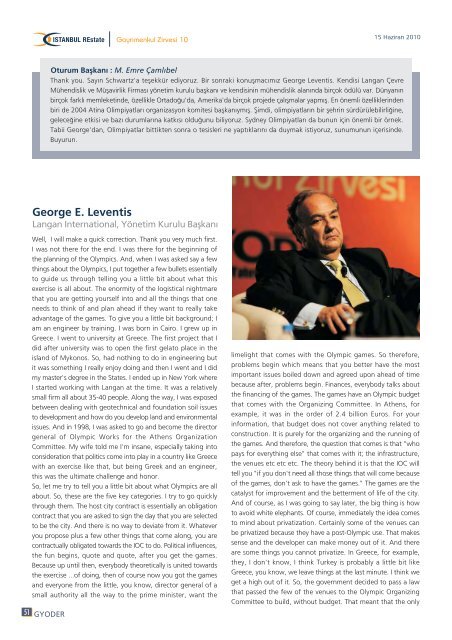Zirve Eki - ISTANBUL REstate
Zirve Eki - ISTANBUL REstate
Zirve Eki - ISTANBUL REstate
Create successful ePaper yourself
Turn your PDF publications into a flip-book with our unique Google optimized e-Paper software.
51 GYODER<br />
Gayrimenkul <strong>Zirve</strong>si 10<br />
Oturum Baflkan› : M. Emre Çaml›bel<br />
Thank you. Say›n Schwartz'a teflekkür ediyoruz. Bir sonraki konuflmac›m›z George Leventis. Kendisi Langan Çevre<br />
Mühendislik ve Müflavirlik Firmas› yönetim kurulu baflkan› ve kendisinin mühendislik alan›nda birçok ödülü var. Dünyan›n<br />
birçok farkl› memleketinde, özellikle Ortado¤u'da, Amerika'da birçok projede çal›flmalar yapm›fl. En önemli özelliklerinden<br />
biri de 2004 Atina Olimpiyatlar› organizasyon komitesi baflkan›ym›fl. fiimdi, olimpiyatlar›n bir flehrin sürdürülebilirli¤ine,<br />
gelece¤ine etkisi ve baz› durumlar›na katk›s› oldu¤unu biliyoruz. Sydney Olimpiyatlar› da bunun için önemli bir örnek.<br />
Tabii George'dan, Olimpiyatlar bittikten sonra o tesisleri ne yapt›klar›n› da duymak istiyoruz, sunumunun içerisinde.<br />
Buyurun.<br />
George E. Leventis<br />
Langan International, Yönetim Kurulu Baflkan›<br />
Well, I will make a quick correction. Thank you very much first.<br />
I was not there for the end. I was there for the beginning of<br />
the planning of the Olympics. And, when I was asked say a few<br />
things about the Olympics, I put together a few bullets essentially<br />
to guide us through telling you a little bit about what this<br />
exercise is all about. The enormity of the logistical nightmare<br />
that you are getting yourself into and all the things that one<br />
needs to think of and plan ahead if they want to really take<br />
advantage of the games. To give you a little bit background; I<br />
am an engineer by training. I was born in Cairo. I grew up in<br />
Greece. I went to university at Greece. The first project that I<br />
did after university was to open the first gelato place in the<br />
island of Mykonos. So, had nothing to do in engineering but<br />
it was something I really enjoy doing and then I went and I did<br />
my master's degree in the States. I ended up in New York where<br />
I started working with Langan at the time. It was a relatively<br />
small firm all about 35-40 people. Along the way, I was exposed<br />
between dealing with geotechnical and foundation soil issues<br />
to development and how do you develop land and environmental<br />
issues. And in 1998, I was asked to go and become the director<br />
general of Olympic Works for the Athens Organization<br />
Committee. My wife told me I'm insane, especially taking into<br />
consideration that politics come into play in a country like Greece<br />
with an exercise like that, but being Greek and an engineer,<br />
this was the ultimate challenge and honor.<br />
So, let me try to tell you a little bit about what Olympics are all<br />
about. So, these are the five key categories. I try to go quickly<br />
through them. The host city contract is essentially an obligation<br />
contract that you are asked to sign the day that you are selected<br />
to be the city. And there is no way to deviate from it. Whatever<br />
you propose plus a few other things that come along, you are<br />
contractually obligated towards the IOC to do. Political influences,<br />
the fun begins, quote and quote, after you get the games.<br />
Because up until then, everybody theoretically is united towards<br />
the exercise ...of doing, then of course now you got the games<br />
and everyone from the little, you know, director general of a<br />
small authority all the way to the prime minister, want the<br />
15 Haziran 2010<br />
limelight that comes with the Olympic games. So therefore,<br />
problems begin which means that you better have the most<br />
important issues boiled down and agreed upon ahead of time<br />
because after, problems begin. Finances, everybody talks about<br />
the financing of the games. The games have an Olympic budget<br />
that comes with the Organizing Committee. In Athens, for<br />
example, it was in the order of 2.4 billion Euros. For your<br />
information, that budget does not cover anything related to<br />
construction. It is purely for the organizing and the running of<br />
the games. And therefore, the question that comes is that "who<br />
pays for everything else" that comes with it; the infrastructure,<br />
the venues etc etc etc. The theory behind it is that the IOC will<br />
tell you "if you don't need all those things that will come because<br />
of the games, don't ask to have the games." The games are the<br />
catalyst for improvement and the betterment of life of the city.<br />
And of course, as I was going to say later, the big thing is how<br />
to avoid white elephants. Of course, immediately the idea comes<br />
to mind about privatization. Certainly some of the venues can<br />
be privatized because they have a post-Olympic use. That makes<br />
sense and the developer can make money out of it. And there<br />
are some things you cannot privatize. In Greece, for example,<br />
they, I don't know, I think Turkey is probably a little bit like<br />
Greece, you know, we leave things at the last minute. I think we<br />
get a high out of it. So, the government decided to pass a law<br />
that passed the few of the venues to the Olympic Organizing<br />
Committee to build, without budget. That meant that the only


